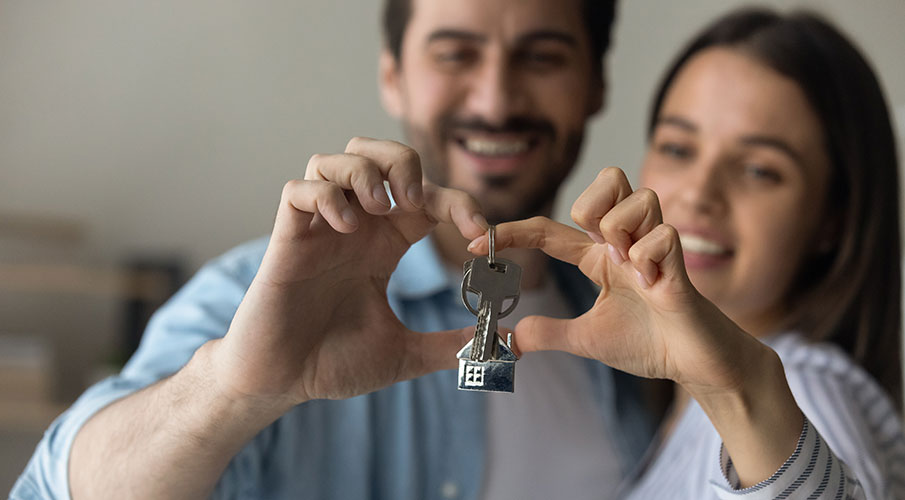
You’ve found your perfect home. Now you want to let the seller know you are interested in an offer. Adding a good faith deposit, or earnest money, sets your offer apart from the others and lets the seller know you’re serious.
But what is earnest money and why is it important? How can you protect your deposit without a mortgage broker? Let’s explore the ins and outs of earnest money and how it can help you buy a home.
What is earnest money?
You may have heard the term “earnest money” or “good faith deposit,” but what does it mean? Earnest money is simply a security deposit. It demonstrates to a seller that you are committed to buying their home.
When a seller accepts an offer, they may remove the house from the market, potentially missing out on other offers. Sometimes, however, buyers back out after an offer is accepted. A good faith deposit assures them you are less likely to change your mind about buying their home while you’re waiting for appraisals and inspections. They know you don’t want to lose that money if you can help it.
Why is it important?
If you love a home and want to attract a seller’s attention, earnest money helps. This is key when a property is in high demand. In a competitive market, it’s important to help the seller notice you. Earnest money is not usually required, but it could make your offer more favorable and help the seller decide to choose yours over any others.
It’s important to note that a good faith deposit isn’t extra money; it’s just providing some of the money you will eventually pay earlier in the process. When the sale goes through, the earnest money is applied to your down payment or to closing costs. More on this in a moment.
How much do I offer?
The amount you offer depends on the real estate market. A slow market means there is likely less interest in the property, and it may require a smaller deposit. A competitive market, however, means the seller is likely to receive multiple offers. If your ideal home has many interested buyers, you may want to make a higher good faith offer.
The standard range for an earnest money offer is between 1% and 3% of the sale price. Partnering with a real estate agent can help you better understand the market and make an offer that’s appropriate where you’re buying. If there are bidding wars in the neighborhood, for example, you can make a stronger offer to help secure the property.
What happens to my deposit?
As we’ve said, usually, a good faith deposit is applied to your down payment or closing costs. But what if someone backs out? Maybe the situation has changed, and you no longer wish to buy or the seller no longer wishes to sell. What if the property doesn’t pass the home inspection? Is the money refundable?
With certain contingencies, you can back out without losing your deposit. If the home fails the inspection or is appraised at less than the sale price, if the seller changes their mind, if your current home isn’t selling or if you aren’t approved for a mortgage, you can choose to walk away risk-free. Work with your real estate agent and lender to make sure these contingencies are in your contract, and be sure to uphold the contract by completing the purchase agreement on time.
As the buyer, if you back out and your reason is not listed in the contingencies of the contract, it’s unlikely that your earnest money will be refunded to you. Instead, the money goes to the seller as compensation for their time and effort and having to relist their home.
Is my earnest money protected?
Your efforts play a part in protecting your earnest money. Rather than give it directly to the seller, you’ll deposit it into an escrow account with a third party, such as a title or escrow company. Your good faith deposit is then held in escrow until closing, at which time it is applied toward the down payment and/or closing costs.
You can also protect your deposit when you pay with a certified check, wire transfer or personal check made out to the third party. Keep a copy of the check and request a receipt. Get everything in writing and put it in the contract. A home is a big investment that’s worth protecting.
What is the role of a mortgage broker?
Mortgage brokers act as intermediaries between mortgage borrowers and mortgage lenders. A mortgage broker does not lend money; it simply helps you shop around for a home loan purchase. However, other lenders can fill the role of a mortgage broker.
Credit unions are a great alternative, for example. A credit union is a direct lender and can serve in place of a mortgage broker. Credit unions may offer more affordable mortgage loan options since they are not-for-profit institutions. All you have to do is choose a credit union with great home loan rates and low fees.
Consider Solarity Credit Union
If you’ve found your perfect home and are ready to purchase it with a home loan, choose Solarity Credit Union. We help put homeownership within reach with great rates and a step-by-step process that supports you every step of the way. Whether you are a first-time homebuyer or looking to refinance, we’re here to help. Lower interest rates make your dollars go further so you can unlock the door to a home of your own. Contact us today to speak with a Home Loan Guide and learn about our no-down-payment and low-down-payment loan programs. You might find that, for what you're paying in rent, you can afford a home of your own.
Is a good faith deposit right for you?
Help the homebuying process with earnest money. You’re protected if something is wrong with the property, and if it’s move-in ready, it shows the seller you are serious about your offer to purchase their home. Make a good faith deposit and secure your new home.
What's your Solarity story?
We're on a mission to tell the stories of our members and how they are living their best lives. Do you have a Solarity story to share?
